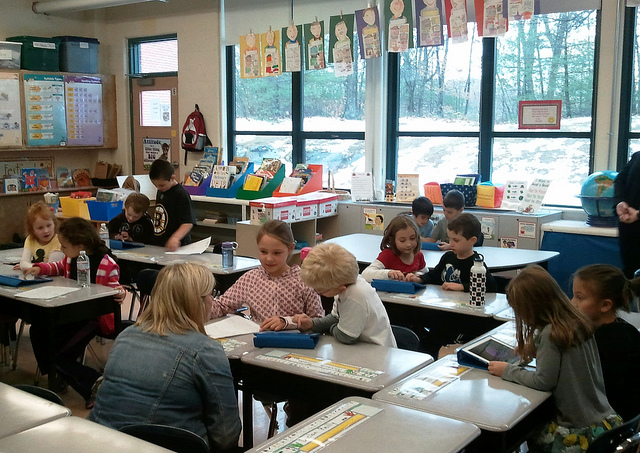We need renewed political commitment to citizenship education and ongoing monitoring of its provision in schools
Citizenship was added to the National Curriculum in England twelve years ago. As part of our series on youth participation in politics, David Kerr discusses how citizenship has fallen in prominence in recent years as schools have faced other pressures and teaching requirements have been relaxed. He argues for ongoing monitoring of the provision of citizenship education.

Citizenship education was added to the National Curriculum in England in 2002. Credit: Matt Malone, CC BY-NC-SA 2.0
‘We should not, must not, dare not, be complacent about the health and future of British democracy. Unless we become a nation of engaged citizens, our democracy is not secure.’
These are the words of the then Lord Chancellor, quoted in the seminal Crick Report in 1998. The advisory group on ‘Education for Citizenship and the Teaching of Democracy in Schools’, chaired by Professor (Sir) Bernard Crick, was set up in 1997 with cross-party support. It was a response to concern about increasing signs of a breakdown in shared engagement in society. These included anti-social behaviour, lack of community spirit and a decline in participation in civic and political practices. There was a specific concern that such decline was affecting young people especially, creating what was termed a ‘democratic deficit’ time bomb.
It was, therefore, no surprise that the Crick Group focused its deliberations primarily on young people. The solution proposed was for an emphasis on ‘political literacy’; defined as ‘educating young people to be effective in public life’. This is broader than political education and involves blending civic knowledge and active citizenship in an ‘education FOR citizenship’. Such an education aimed at bringing about ‘no less than a change in the political culture of this country both nationally and locally’. The Crick Report was accepted by all party leaders and led, four years later, to the introduction of statutory Citizenship for all students age 11 to 16 as part of the National Curriculum in England in 2002. It was closely followed by a similar strengthening of citizenship education in other UK countries.
What happened 1998 to 2010?
The promotion of ‘political literacy’ through education continued apace in the decade following the Crick Report. New curricula and initiatives were launched at primary, secondary, post-16 and university levels, as well as in civil society. Teachers, new and existing, received training and a plethora of advice, guidance and frameworks were produced to assess, monitor, inspect and evaluate the progress of pupils, teachers and education institutions alike. Meanwhile numerous research studies were initiated at local, national, European and international level in order to create a strong evidence base to inform on-going policy and practice which highlighted:
1) Evidence of the benefits, both short and long-term, of developing political literacy through effective education for citizenship for pupils, schools, communities and society.
As a major recent study concluded, high-quality citizenship education ‘has lasting effects on social and political engagement, and teaches skills useful across academic disciplines and in the workplace’. There is a clear link between civic knowledge and current and intended political participation, with those with higher levels of knowledge more likely to participate. Civic knowledge is also boosted by discussing controversial issues in modern society and this, in turn, helps to develop skills of deliberation, collaboration and public speaking. Meanwhile, belonging to student groups is shown to increase engagement in community life and politics. Indeed, many schools testify to the benefits that have come about from citizenship education as a result of encouraging pupils to take more responsibility for the shared life of the school and the wider community. The CELS-CIVT study found evidence that the first cohort to have statutory Citizenship in schools had increased civic knowledge and enhanced civic skills and attitudes that were impacting on their political and civic engagement in their early 20s as they made the transition to adulthood.
2) Models of effective practice in the delivery of high-quality education for citizenship.
Evidence from the NFER longitudinal study of Citizenship and Ofsted subject inspections between 2000 and 2012 showed that many schools do deliver the subject with imagination and confidence. It also highlighted that the quality of provision and pupils’ civic knowledge is intrinsically linked to the quality of teaching. The best teaching and provision is where there are trained specialist teachers leading the subject, who plan the provision and ensure that learning is assessed. This means that pupils in these schools receive regular Citizenship lessons which enable them to develop their civic knowledge and skills and experience active citizenship throughout compulsory schooling. Similar models are identified at European and international level.
3) Considerable gaps in the knowledge, skills, experiences and confidence of pupils and teachers and in school provision.
Ofsted’s reports highlight that even in schools where provision is strongest there remain weaknesses in the teaching of key aspects of Citizenship including political literacy. Schools are not addressing all aspects of the statutory Citizenship curriculum sufficiently, particularly where the subject is taught by non-specialist teachers who lack expertise. In particular, some teachers find the political literacy aspects of the curriculum and teaching controversial issues intimidating. There remain considerable gaps in the numbers of those trained to teach the subject. The number of initial education places available for Citizenship (currently around 120) is considerably fewer than for other National Curriculum subjects.
New concerns – 2010 to present
These developments highlighted that, though a good start was made in the decade following the Crick Report, there was still much work to do to ensure every pupil receives a high-quality education for citizenship that develops their political literacy. By 2010 the political and education landscape was considerably changed from that in 1998 when the Crick Report was published. It has continued to change apace through to 2014. This presents new concerns and challenges for promoting young peoples’ political literacy through a high-quality education for citizenship. In particular, the worldwide economic crisis has provided a new and harsh backdrop to any discussion about policy and practice. There is growing evidence that the crisis is having a seismic impact on civic and political participation, with increasing numbers of people, particularly amongst young people, expressing declining levels of confidence in politicians and in the workings of the political process at national and European level.
Meanwhile, in the UK the election of the new Coalition Government in 2010 ushered in changed policy emphases and policy implementation in response to the crisis. Chief amongst these in education has been the establishment of overarching policy frameworks, such as the new National Curriculum 2014, which are then implemented on the ground with limited government involvement. This encourages market forces to form new delivery partnerships and mechanisms, leading to what critics call the ‘balkanization’ of education. Having something in a policy framework is no guarantee that it will be delivered effectively on the ground.
The new Coalition Government was initially advised by an Expert Panel to remove Citizenship from the statutory National Curriculum. However, following a concerted campaign led by the pressure group Democratic Life, Michael Gove, the new Secretary of State for Education, decided the subject should retain its statutory status for all 11 to 16 year-olds. However, this period of uncertainty resulted in schools reducing their provision and support for Citizenship and some withdrawing from using the GCSE Citizenship Studies. Meanwhile the new 2014 Citizenship curriculum has changed emphases with more weight given to civic knowledge and the prominence of financial and social citizenship at the expense of the political. Also civic knowledge is uncoupled from active citizenship with the latter being promoted through the flagship National Citizens Service (NCS).
On top of this curriculum shift, the freedom and flexibility given to schools and colleges to determine their own curriculum approaches (with new Academies and Free Schools exempt from the National Curriculum) and the pressures of Ofsted targets, league tables and education for employability are seeing citizenship drop in prominence in political and education terms. Indeed, there are now clear signs that since 2010 promoting education for citizenship and political literacy has slipped down the agenda for policy-makers and private funders alike, at all levels. This is leading to a dissipation of experience and expertise that has been built up in the system in the decade following the Crick Report. The irony of these shifts is that given the political, economic, social, and technological challenges facing society and young people in particular, the need for high quality education for citizenship that helps young people to develop political literacy is greater than before. It is arguably more important now than in 1998 when politicians rallied behind the Crick group.
What needs to happen now?
Fourteen years on from the seminal Crick Report the concerns that brought the group together remain as topical as ever. However, there is much still to do if the aims and vision of the Report, as endorsed by all political leaders, are to be achieved in practice. Above all, what is needed is a renewed public commitment from political and civic leaders of all persuasions to support the promotion and enhancement of the political literacy and civic participation of young people through a high-quality education for citizenship.
This could be achieved through the formation of a standing Commission on Education for Citizenship, as recommended in the Crick Report, to monitor provision in schools and colleges in England. This would, like the advisory board that led to the introduction of Citizenship in the English National Curriculum, be comprised of representatives from across the political spectrum and experts from education and academia.
This needs to be matched by a similar practical commitment from school and college leaders and governing bodies in schools and colleges. Without such a collective commitment there is a very real concern that a dangerous complacency and disregard for the health of UK democracy will continue to take root. Young people will not be taught how ‘to become a nation of engaged citizens’ and we will sleepwalk into a long-term democratic crisis in the UK.
—
This post is part of a series on youth participation based on the Political Studies Association project, Beyond the Youth Citizenship Commission. For further details, please contact Dr Andy Mycock. An electronic copy of the final report can be downloaded here.
Note: This post represents the views of the author and does not give the position of Democratic Audit or the LSE. Please read our comments policy before responding.
—
David Kerr is a Senior Teaching Fellow at the University of Bristol, and Consultant Director of Education for the Citizenship Foundation.
is a Senior Teaching Fellow at the University of Bristol, and Consultant Director of Education for the Citizenship Foundation.






 Democratic Audit's core funding is provided by the Joseph Rowntree Charitable Trust. Additional funding is provided by the London School of Economics.
Democratic Audit's core funding is provided by the Joseph Rowntree Charitable Trust. Additional funding is provided by the London School of Economics.
[…] Citizenship was added to the National Curriculum in England twelve years ago. As part of our series on youth participation in politics, David Kerr discusses how citizenship has fallen in prominence… […]
RT @democraticaudit: We need renewed political commitment to citizenship education and ongoing monitoring of its provision in schools http:…
We need renewed political commitment to citizenship education and ongoing monitoring of its provision in schools https://t.co/4EIfUHCxGt
We need renewed political commitment to citizenship education and ongoing monitoring of its provision in schools https://t.co/nB7uRJdrLx